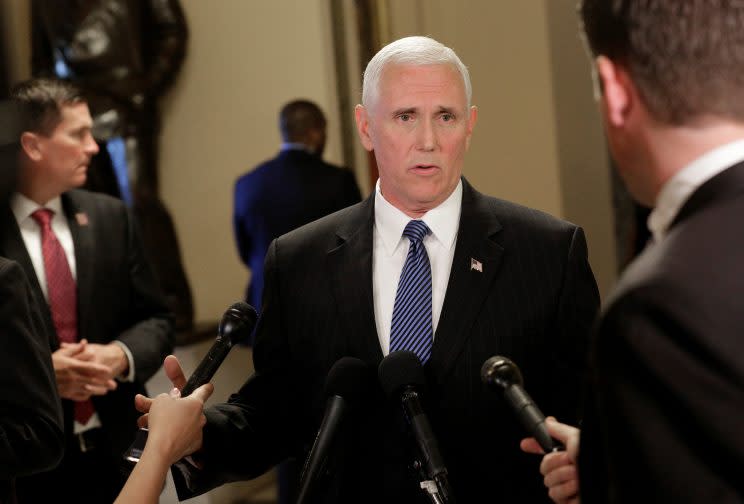Pence’s role as loyal soldier risks long-term damage

WASHINGTON – On Capitol Hill, Republican members of Congress are telling friends with increasing exasperation that they wish Mike Pence were president.
In Indiana, Vice President Pence’s home state, political conversation often includes references to the possibility that their former governor may be in the Oval Office sooner than they ever imagined.
It’s premature talk for now, even if Pence did take the unprecedented step (for a vice president) of creating a political action committee in which he can stash campaign funds. But it reflects the way that most Republicans see Pence as a desirable alternative to President Trump, not only because he is a reliable, mainstream conservative but also because he is normal. He represents stability, something many are desperate for after the constant chaos caused by Trump in his short time in office so far.
Pence is “a calm, sure and steady influence and presence, unfazed by the most difficult challenges that Washington has to offer,” said Transportation Secretary Elaine Chao on Wednesday.
White House aides have confirmed to Yahoo News that Pence sees the need to keep some breathing room between himself and the president. The central question for the vice president going forward will be whether he can avoid getting dragged down with Trump, if the future resembles in any way the last few chaotic months.
The question, in other words, is whether Pence can maintain a sterling reputation after his involvement in the Trump administration.
So far, many conservatives believe he can.
“Nobody looks at Mike Pence and sees anything other than a reputable man,” said veteran Republican consultant Ed Rollins. “I think he will survive it.”
Alice Stewart, who worked for Sen. Ted Cruz’s presidential campaign, said Pence’s “integrity stands alone.”
But Pence’s credibility has taken a series of hits in recent weeks as some of the things he has said in defense of his boss have turned out to be untrue.

Pence made inaccurate comments in mid-January about then-national security adviser Michael Flynn’s meetings with the Russian ambassador. Flynn took the fall for that, losing his job for misrepresenting the substance of his conversations to Pence.
Pence was involved in discussions inside the White House about the firing of FBI Director James Comey last week. He assured the public that the agency’s investigation into Russian interference in the presidential election had nothing to do with the dismissal. Days later, Trump himself contradicted Pence and said the Russian affair had motivated him to fire Comey because he believes it is “a made-up story.”
Then this week, it emerged that as long ago as Jan. 4, Flynn had told Trump lawyer Don McGahn that he was being investigated by the FBI for failing to report his paid lobbying work on behalf of the government of Turkey during the presidential campaign. But as late as March 9, Pence — who had headed the Trump transition operation leading up to the inauguration — claimed he had only just then learned of Flynn’s Turkish contract. That raised the question: Had he really been kept in the dark for more than two months about such an explosive admission by a key Cabinet member?
If Pence was never told, that would mean he was kept out of high-level conversations to a remarkable degree. And that wouldn’t be unthinkable, because it’s unclear to what extent Pence has been looped in to key discussions inside the White House. Pence’s role so far has been nebulous, but he’s been called on numerous times to do things Trump can’t do (such as negotiate knowledgeably with congressional Republicans on the health care bill) and things Trump doesn’t want to do (travel outside the United States, such as on a nine-day trip to Asia in April).
Yet for all this, the payoff for Pence and his constituency so far has been, like Trump’s entire presidency, thin. For all the effort that the vice president put into the health care negotiations to get the bill through the House, the fate of that legislation is still uncertain. It is not close to being voted on in the Senate, and a week solid of constant controversy and tumult inside the White House has put Trump’s entire legislative agenda at risk.
And on one of the key issues of importance to Pence’s strongest constituency — evangelical Christians — Pence was unable to overcome objections from factions inside the White House to a broad religious liberty executive order and had to settle for a narrow version that doesn’t address the biggest concerns of religious conservatives.
Still, unlike everyone in the West Wing except for the president’s daughter, Ivanka, and her husband, Jared Kushner, the vice president cannot be fired. He isn’t going anywhere. And the wisest course of action for him is to keep his head down, exert influence when and where he can, and stay on his toes in case he needs to dance a little further away from the president if Trump’s fortunes continue to slide.
“He’s playing the long game,” Stewart said.

_____
Read more from Yahoo News:



